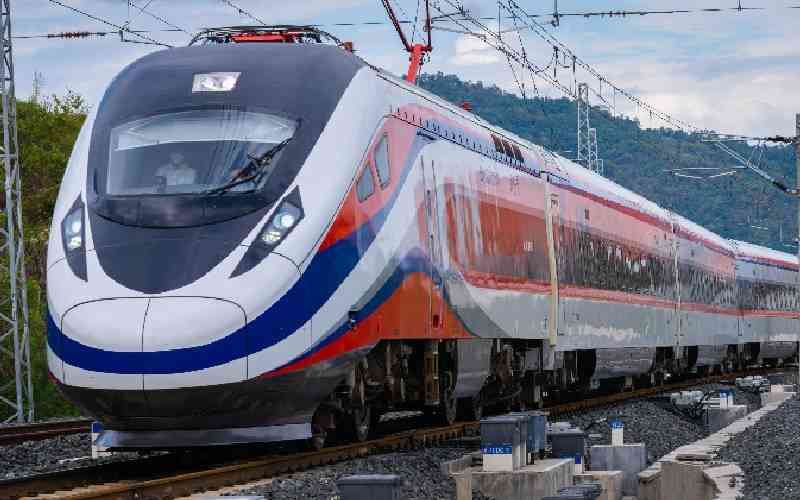
Audio By Vocalize

Speeding through mountains and valleys, trains are carrying a rising volume of freight and passengers on the China-Laos Railway, a travel option that is cost and time-effective.
Since its launch in December 2021, the 1,035 km rail line, which links the Lao capital Vientiane with Kunming, the capital of southwest China's Yunnan Province, has generated benefits more than just at local levels.
With 19 million passengers and 24 million tonnes of freight delivered and its cross-border cargo transport covering over 10 countries and regions, the railway has become a docking project between the China-proposed Belt and Road Initiative (BRI) and Laos' strategy to convert itself from a landlocked country to a land-linked hub in the Indo-China Peninsula, benefiting both countries and beyond.
Game-changer
With only a 3.5 km-long railroad to Thailand, the economic development of Laos, the only landlocked country in Southeast Asia, had long been restricted.
The China-Laos Railway has become a game changer for the country, opening it up to greater economic opportunities, boosting its connectivity with other parts of the region, and facilitating economic and trade cooperation, analysts said.
In northern Laos' Luang Prabang province, Yang Shixian's company has switched to the railway from road transport and seen its freight costs fall.
Since the railway was put into service, the company has turned to the railway to handle all its shipments to China, about 3,000 tonnes of rubber products every month. "It helps us lower costs, and enables us to offer higher salary to our employees," Yang said.
The railway has also put the tourism sector on a fast track.
Thanks to the launch of the China-Laos Railway cross-border passenger train service in April this year, tourism got revived in Laos, a top priority amid the Lao government's efforts to revitalize the economy this year.
In the first half of the year, the country welcomed more than 1.6 million foreign tourists, compared with only 42,197 a year ago, according to data from the Tourism Marketing Department of the Lao Ministry of Information, Culture, and Tourism.
The Lao authorities estimated that around 368,000 Chinese travelers will visit Laos in 2023, up 21 percent from last year.
From "hard link" to "heart link"
"The railway marks a milestone of the two countries' friendship in a new era," said Manila Sombandith, the consul general of Laos in Kunming.
For many, like Silivong Phouthachack, a Lao teacher, the railway is more than just a physical infrastructure of connectivity. It's a project that is set to boost people-to-people bonds.
Stay informed. Subscribe to our newsletter
Silivong and 39 others just finished their 18-month-long study at the Kunming Railway Vocational and Technical College, where they were taught how to teach railway-related technology. They will be the first teachers in Laos' first railway vocational and technical college, which China assisted in building.
"After I return, I will teach what I've learned in China to others," said Silivong.
The China-Laos Railway has turned the "hard link" between the two countries into a "heart link" between the two peoples, said Ma Yong, head of the Institute of Southeast Asian Studies under the Yunnan Academy of Social Sciences.
From landlocked to land-linked
Pannaros Boonserm, a 33-year-old Thai, was impressed by how the China-Laos Railway has changed people's lives in Laos. Working as a translator at the China-Thailand railway construction project, she hoped the China-Thailand railway would be completed and start operation as soon as possible.
Having studied at Nankai University in north China's Tianjin Municipality for several years, Pannaros visited many places in China and witnessed how high-speed railways have improved local residents' living standards.
"I'm expecting the connectivity of the China-Laos-Thailand railway. By then, I can take a train trip all the way northward from Bangkok to Kunming in China's Yunnan Province," she said.
When the China-Thailand Railway is completed, it will take trains from the Thai capital of Bangkok to the country's northeastern border town of Nong Khai, where a bridge will connect it with the southern end of the China-Laos Railway.
Analysts said the connection will not only inject vitality into the economy along the line but strengthen the trans-Asian railway network and promote regional connectivity.
An artery running through the Indo-China Peninsula will be formed, which will further promote economy, trade, and investment and boost common prosperity when linked to the China-Europe freight train network and with closer cooperation under the BRI, said Wirun Phichaiwongphakdee, director of the Thailand-China Research Center of the Belt and Road Initiative, who has been to Laos several times to conduct research into the China-Laos Railway.